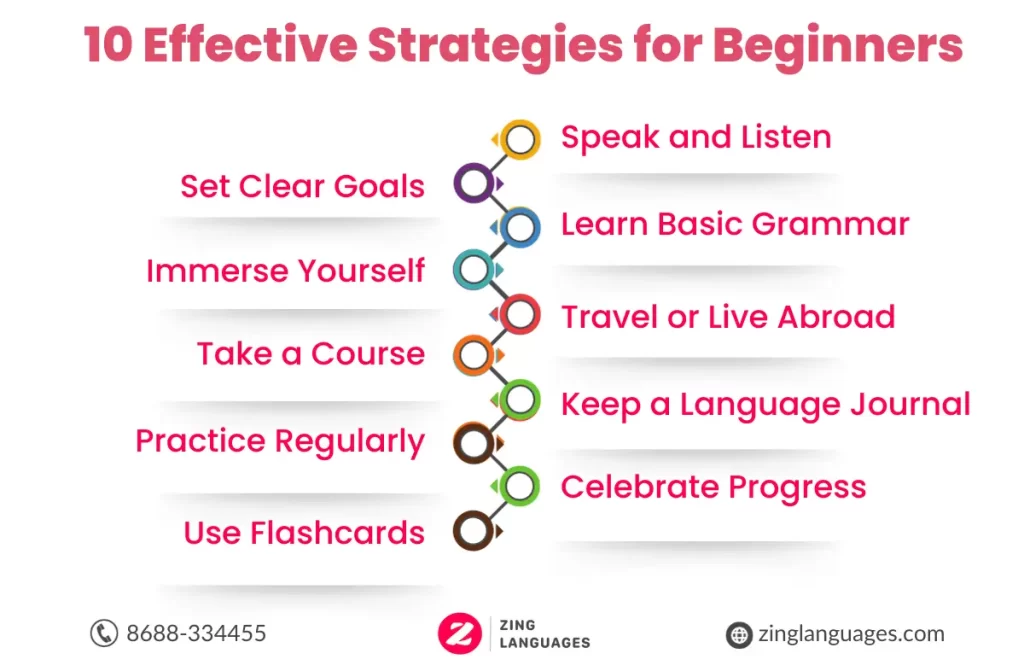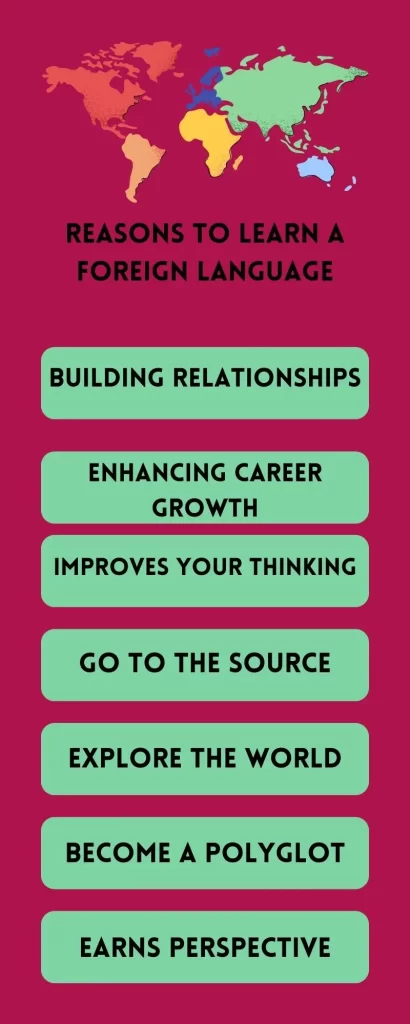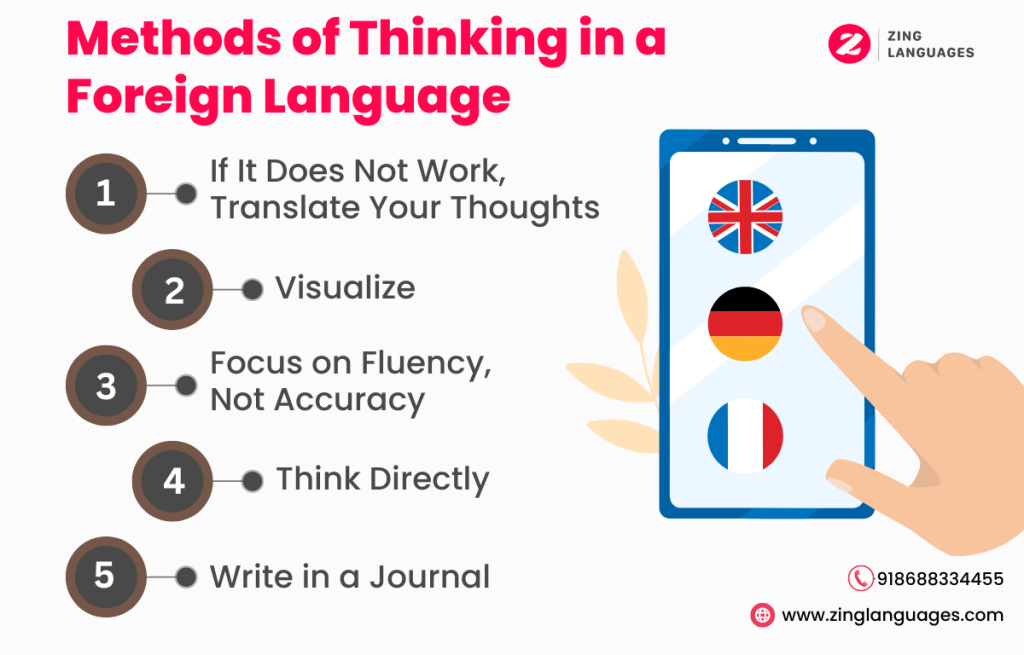Best way to learn a foreign language, learning a new language is an exciting journey that opens doors to new cultures, people, and opportunities. While it may seem daunting at first, there’s no one best way to learn a foreign language.
Instead, there are numerous effective strategies for beginners to explore. In this comprehensive guide, we will delve into the world of language learning, offering 10 proven strategies to help you on your path to becoming a multilingual master. Plus, we’ll discuss the best languages to learn in 2024 for added motivation.
Best Way to Learn a Foreign Language
The most effective way to learn a foreign language involves immersion in the culture, frequent practice, quality learning materials, dedicated language partners, and a strong motivation to achieve fluency.

Setting Realistic Goals
The first step on your language-learning journey is setting clear and achievable goals. Knowing why you want to learn a new language best way to learn a foreign language and what you aim to achieve will keep you motivated. Whether it’s for travel, business, or personal enrichment, having a specific objective in mind is crucial.
Choose the Right Language
Picking the right language to learn is essential. In 2024, some of the best languages to learn include Spanish, Mandarin Chinese, and Arabic due to their global significance. However, select a language that resonates with your interests and goals. Learning a language you’re passionate about will make the process more enjoyable and sustainable.
Immerse Yourself
Immersion is one of the most effective strategies for language learning. Immerse yourself in the language you’re learning. Surround yourself with native speakers, practice regularly, and dive into cultural experiences to accelerate your language skills. Additionally, consider finding a best way to learn a foreign language exchange partner or joining online communities where you can interact with native speakers.
Utilize Language Learning Apps and Resources
Language learning apps and resources have revolutionized the way we learn languages. Leverage language learning apps and a variety of resources to enhance your language skills. These tools provide interactive lessons, practice exercises, and cultural insights for effective learning.
Online dictionaries, grammar guides, and YouTube channels dedicated to language learning are also valuable resources.
Consistent Practice and Repetition
Consistency and repetition are the keys to language mastery. Dedicate a specific time each day to practice, even if it’s just for 15-30 minutes. Repeated exposure to the language helps reinforce your memory and improve your skills.
Join Language Classes
Enrolling in language classes, whether in person or online, provides structured learning and opportunities for interaction with instructors and fellow learners. Classes offer a supportive environment for practicing speaking and writing.
Joining language classes is one of the best ways to learn a foreign language. Whether in person or online, these classes provide structured learning, expert guidance, and opportunities to interact with fellow learners.
Keep a Language Learning Journal
Maintaining a language learning journal can help track your progress and reinforce what you’ve learned. Write daily entries, record new vocabulary, and jot down your thoughts in the target language. This habit enhances writing skills and keeps you engaged with the language.
Maintaining a language learning journal is a valuable tool for tracking your progress. Document new vocabulary, grammar rules, and your thoughts in the target language. Reviewing your journal enhances retention and provides a record of your language development.
Read also Foreign Language Courses in Delhi.
Embrace Cultural Learning
Best languages to learn in 2024 Language and culture are intricately connected. Explore the culture of the language you’re learning, from its customs and traditions to its history and art. Understanding the cultural context can deepen your appreciation and comprehension of the language.
Embracing cultural learning while studying a foreign language is one of the best way to learn a foreign language. Explore traditions, art, cuisine, and customs to gain a holistic grasp of the culture and language.
Set Milestones and Celebrate Progress
Best way to learn a foreign language by learning is a journey with milestones along the way. Set achievable goals like mastering a specific number of words or having a basic conversation within a set timeframe. Celebrate your achievements to stay motivated.
Setting milestones in your language learning journey helps track your progress and stay motivated. Celebrate achievements, whether it’s mastering a new skill or passing a language proficiency test. Recognizing your success boosts confidence and encourages further learning.
Travel and Real-Life Practice
If possible, travel to a region where the language is spoken. Real-life practice in immersive environments can accelerate your language skills. Engaging with locals and navigating daily activities in the target language is a valuable experience.
Traveling to a foreign country and engaging in real-life conversations is one of the best way to learn a foreign language. It offers cultural insights and practical experience that can’t be replicated in a classroom.
Top 10 Reasons to learn a foreign language
Building relationships
The most rewarding aspect of our experience is our ability to connect easily with others by communicating with someone to build lifelong relationships. That too speaking a foreign language and getting connected with cross-cultural people is an incredible gift. It enhances both their personal and professional lives opening up their world literally and figuratively.
Language is a tool that connects people. Building relationships stands out as one of the top reasons to learn a foreign language.
Enhancing career growth
If you are a student or an entrepreneur you get to increase your language skills which makes your growth unique ahead of the crowd. If you are a working professional, you can communicate seamlessly with new customers by expanding to overseas markets in learning a foreign language.
Especially among students and professionals, career growth development is one of the major reasons to learn a foreign language.
Improves your thinking
The cognitive benefits of learning foreign languages assist a person with improved memory, enhanced concentration, ability to multitask, better-listening skills, problem-solving, and critical-thinking skills. Also, they switch between competing tasks and monitor changes in their environment more easily than monolinguals with greater creativity and flexibility.
If you are aged below 14, then this should be among the top reasons to learn a foreign language now.
Deepen Your Connection with Cross Cultures
Language is the most direct connectivity to other cultures where you can foster an appreciation for the arts, traditions, religions, and history of the people associated with that language. On the other perspective, greater understanding promotes tolerance, empathy, and acceptance of others. Students who have studied another language are open-minded and express more positive attitudes toward the culture associated with that language.

Explore the World
Traveling as a speaker of the regional language revolutionizes a trip abroad. While monolingual travelers are capable of visiting the same places, a person who has learned a foreign language can easily navigate outside the tourist area and get connected by interacting with the place or the people in a way that is often inaccessible to those without the language. Learning another language also opens doors to more opportunities for studying or working abroad.
Go to the Source
In a multilingual world, speaking at least one extra language empowers us to access information that would have otherwise been off-limits. For example, individuals who are proficient in other languages are able to navigate the Internet as genuine global inhabitants in consuming and assessing foreign media and entertainment.
Check out Oldest Languages Of The World.
Become a Polyglot
Learning a foreign language not only improves your communication skills and vocabulary but also helps you to choose additional languages at a much easier feat, especially among children. The main reason is when you learn a foreign language, you develop new brain networks to embark yourself to learn two languages at the same time
Today, you can learn languages from the comfort of your home with apps such as Duolingo. Check out the review of Duolingo.
Boosts Your Confidence
Any language learner would definitely make mistakes while discovering a new language which is an essential part of the learning process. Learning a foreign language means putting yourself out there and coming out of your comfort zone. The other aspect is you get an amazing sense of accomplishment while conversing with someone in their native language.
Strengthen Your Decision Making
Decisions made in your second language are more reason-driven compared with your native language. Also, when we deliberate in a second or third language, it is obvious to distance ourselves from the emotional responses and biases which are deeply associated with our mother tongue to make us systematic and take clear-headed decisions based on reality.
Earns Perspective
As we explore a new language and culture, we get to draw comparisons to what is most familiar. Learning a foreign language illuminates our own culture in both positive and negative aspects which we may not have previously considered. You may either find a greater appreciation for what you have acquired, or you may make decisions to shake things up!
Do you have any other reasons to learn a foreign language? Comment below, we would love to hear your thoughts.
Foreign language study is simply part of a very basic liberal education: to “educate” is to lead out, to lead out of confinement and narrowness and darkness.
Benefits of thinking in a foreign language
Here are some benefits how to think in a foreign language, that can give you a myriad of opportunities to explore your cognitive and social benefits.

Improved Problem-Solving Skills
One of the key benefits of how to think in a foreign language is improved problem-solving skills. When we think in a language other than our native tongue, we are forced to approach problems and challenges in Mastering a New Language and different ways.
This can increase mental flexibility and adaptability, allowing us to think critically and creatively about solutions. It can also enhance decision-making abilities, as we are forced to weigh different options and consider their implications in a language that is not our own.
Read Also Foreign Language Classes in Chennai.
Increased Creativity
Thinking in a foreign language can also increase creativity. When one urges how to think in a foreign language, especially for any new language, we are exposed to new concepts and ideas, which can inspire us to think in new and unique ways. We may also find that we are able to express ourselves in ways that we cannot in our native language, which can be a source of inspiration and empowerment.
Additionally, thinking in a foreign language can make us more open to diversity and cultural differences, which can expand our creative horizons and help us to see the world in new ways.
Better Communication with People from Different Cultures
Finally, thinking in a foreign language can improve communication with people from different cultures. When we speak a foreign language, we are able to connect with people who might otherwise be out of reach. This can increase our understanding of how to think in a foreign language of different perspectives and help us to develop greater empathy and respect for other cultures.
It can also enhance our ability to connect with people from different backgrounds, which can be an important asset in both our personal and professional lives.
Achieving the Skill and how to think in a foreign language
While there are many benefits to how to think in a foreign language, it’s important to acknowledge that it can also be a challenging skill to achieve. Some of the challenges include a slower thinking speed, limited vocabulary, and the need to translate in your head.
However, there are strategies that can help you to overcome these challenges and achieve the ability to think in a foreign language. These strategies include practicing regularly, immersing yourself in the language, and using mnemonic devices. Finding a language exchange partner, attending language classes, or joining language communities can also help you get more practice and exposure to the language.
Conclusion
Thinking in a foreign language as well as being willing how to start thinking in another language is a valuable skill that can bring many cognitive, social, and personal benefits. When one how starts thinking in another language as well It can enhance problem-solving skills, increase creativity, and improve communication with people from different cultures. By practicing regularly and using the strategies discussed in this blog post, you can achieve this important skill and unlock a world of new opportunities when you get to know some easy way tips & benefits on how to think in a foreign language, just Read this blog carefully!
check out Smart goals for learning a new language.

